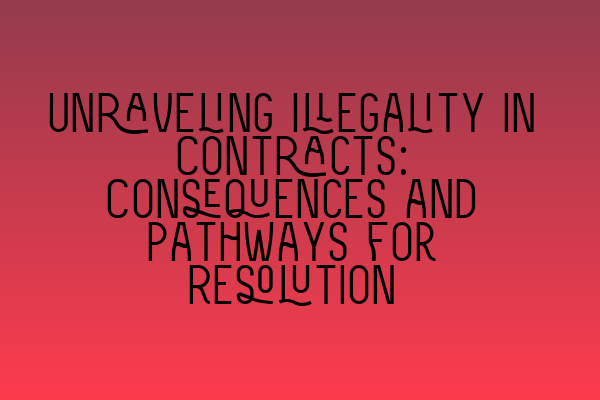Unraveling Illegality in Contracts: Consequences and Pathways for Resolution
Introduction:
Contracts are the cornerstone of business transactions, ensuring that parties uphold their obligations and rights. However, there are instances when contracts may involve illegal activities or terms that contravene the law. In such cases, the consequences can be severe, and it becomes crucial to understand the pathways for resolution. In this blog post, we will explore the implications of illegality in contracts and provide insights into resolving these complexities.
Unveiling the Consequences:
The consequences of an illegal contract can be far-reaching and may impact the parties involved in various ways. Understanding these implications is essential for both individuals and businesses to protect their interests. Some of the key consequences of illegality in contracts include:
1. Voidable Contracts: Contracts that involve illegal activities or have unlawful terms are considered to be voidable. This means that they are unenforceable by the parties involved. For instance, if a contract for the sale of illegal substances is entered into, the court will not enforce it, and the parties will not be able to rely on the contract to claim their rights.
2. Unenforceable Contracts: In certain cases, the contract may not be completely void but may be rendered unenforceable due to illegality. This means that although the contract remains valid, neither party can seek legal remedies or enforce the contract if a dispute arises.
3. Criminal Liability: Participating in an illegal contract can lead to criminal liability for the parties involved. This can result in fines, imprisonment, or other legal consequences, depending on the nature and severity of the illegality.
4. Financial Losses: Illegal contracts can often lead to significant financial losses for the parties involved. In addition to being unable to enforce the contract, they may also face the burden of restitution or damages to compensate for any losses incurred.
Resolving Illegality in Contracts:
While the consequences of illegality in contracts can be daunting, there are pathways for resolution that can help parties mitigate the damages and protect their interests. Let’s explore some of the approaches:
1. Severance: In some cases, the court may choose to sever the illegal or unenforceable terms from the contract while upholding the remaining valid portions. This allows for the preservation of the lawful elements of the agreement. However, severance is subject to the court’s discretion and may not always be applicable.
2. Restitution: When an illegal contract is deemed unenforceable, the court may order restitution to restore the parties to their original positions prior to entering into the contract. This can involve the return of any benefits derived from the contract, financial compensation, or other appropriate remedies.
3. Exclusion of Illegality: In certain circumstances, the courts may choose to exclude illegality from consideration altogether if doing so aligns with public policy. This approach aims to ensure fairness and prevent unjust enrichment or exploitation resulting from the illegality.
4. Public Interest Considerations: In some cases, public policy considerations may play a significant role in resolving illegality in contracts. The courts may weigh the public interest against the enforcement of the contract and determine appropriate remedies or sanctions accordingly.
Conclusion:
Illegality in contracts poses significant challenges and consequences for all parties involved. Understanding the potential ramifications and pathways for resolution is crucial to navigate these complexities effectively. By seeking legal advice and exploring the available options, individuals and businesses can mitigate the damages caused by illegal contracts and protect their interests.
Related Articles:
– SQE 1 Practice Exam Questions
– SQE 1 Practice Mocks FLK1 FLK2
– SQE 2 Preparation Courses
– SQE 1 Preparation Courses
– SRA SQE Exam Dates
